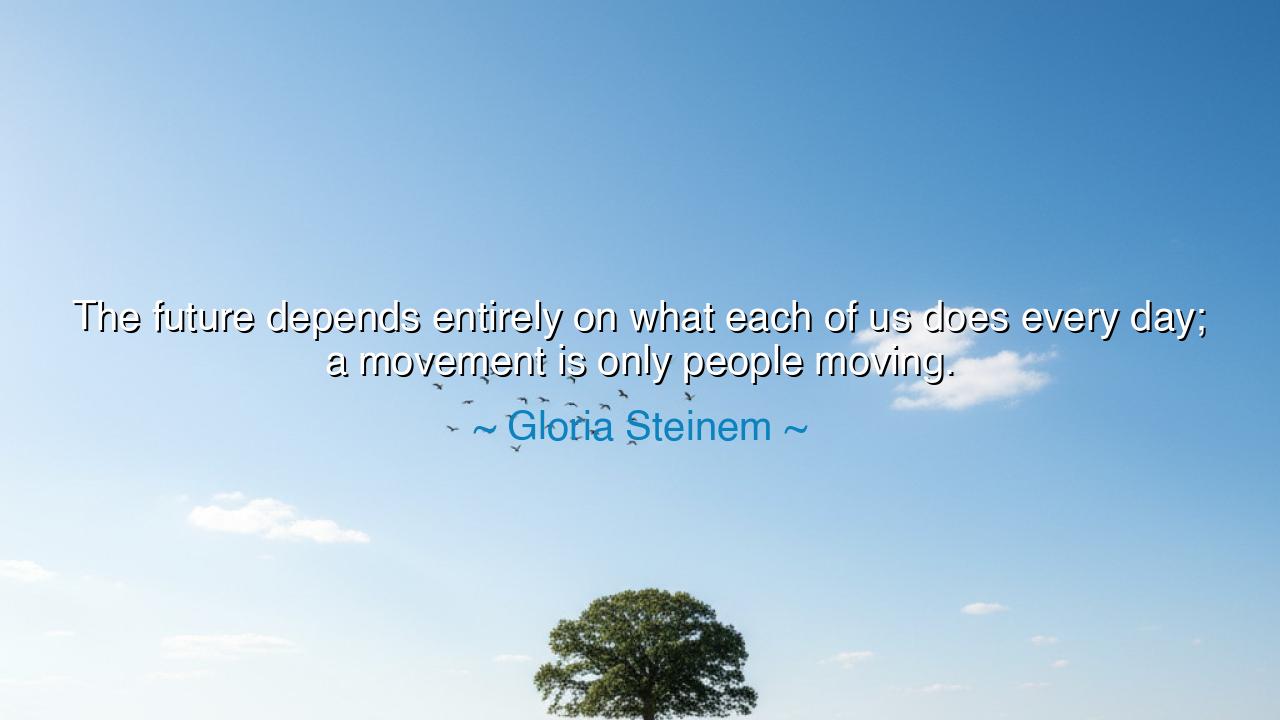
The future depends entirely on what each of us does every day; a
The future depends entirely on what each of us does every day; a movement is only people moving.






"The future depends entirely on what each of us does every day; a movement is only people moving." – Gloria Steinem.
In this powerful statement, Gloria Steinem calls us to recognize the immense impact of individual actions on the broader scope of society and history. The future, Steinem argues, is not a distant event that happens beyond our control but a collective outcome shaped by the choices and efforts of each person, every single day. This insight speaks to the power of agency, the notion that change is not something that happens to us, but something that we actively participate in. Steinem's words remind us that movements, whether for social change, justice, or progress, are only as powerful as the people who choose to act and move together toward a common goal.
The ancient philosophers, particularly Plato, understood the concept of individual responsibility in shaping the collective good. In The Republic, Plato emphasized that society’s health depends on the virtue and action of each individual, for it is only when each person fulfills their role that the community as a whole thrives. Similarly, Steinem’s quote reflects the idea that the future is a reflection of the efforts, struggles, and virtues of those who act in the present. A society cannot evolve or improve unless its people are willing to engage in the work of transformation. Steinem’s vision is one where the future is not a passive inheritance, but a dynamic creation, made possible through the actions we take every day.
Consider the story of Mahatma Gandhi, whose movement for Indian independence was born not from a single leader’s vision but from the collective action of countless individuals. Gandhi’s call to nonviolent resistance was echoed by millions who took to the streets, fasted, and resisted the British colonial powers. Gandhi himself was deeply aware of the power of the people, once stating, "Be the change you wish to see in the world." His movement was successful not because of his singular effort but because people, one by one, joined in the fight for freedom, equality, and justice. Gandhi understood that a movement is only people moving, as Steinem puts it, and that the future of India depended on the active involvement of its people.
The ancient Greeks, too, understood that change is driven by collective effort. Pericles, the great Athenian leader, famously declared that Athens was a democracy because its people chose to participate in public life. The power of the Athenian democracy was not in the hands of a few leaders, but in the active participation of its citizens. Just as Pericles emphasized the role of individuals in shaping the city’s destiny, Steinem underscores the idea that progress is dependent on people’s choices to act, to challenge injustice, and to work together for a common cause. True change does not come from waiting for someone else to lead but from the collective will of those who are willing to move toward a better future.
Steinem’s words also echo the power of grassroots movements, where change often begins with small actions by ordinary individuals. The civil rights movement in the United States is a prime example. While figures like Martin Luther King Jr. are celebrated for their leadership, the movement itself was powered by countless individuals—protestors, activists, and everyday citizens—who stood up for equality and justice. The sit-ins, freedom rides, and marches were all actions taken by individuals who refused to accept the status quo. The collective energy and commitment of these people proved that even small, individual actions can have a monumental impact on history.
In our own time, we can look to the environmental movement as a modern example. While Greta Thunberg became the face of global climate action, her influence grew not from her individual efforts alone, but from the millions who joined her in the fight against climate change. Her Fridays for Future campaign spread across the world because people, young and old, recognized that they had a role to play in securing a sustainable future. Each act of protest, every signature on a petition, and each commitment to reducing personal carbon footprints contributes to the broader movement. Like Steinem’s call to action, this movement proves that change is not imposed by one leader, but by a collective effort of individuals who choose to act.
The lesson here is that the future is not an abstract, distant concept. It is shaped by what we do today, one action at a time. The future depends entirely on what each of us does every day, and every individual has the power to contribute to the world they wish to create. Steinem’s reminder is that collective action is the key to creating the change we desire. The movements that shape our world are built on the foundation of individual decisions to act, to challenge the status quo, and to move toward progress.
Thus, we must ask ourselves: what are we doing today to shape the future? What choices are we making that will influence the world for future generations? In our everyday lives, let us live consciously and act purposefully, knowing that even the smallest actions are part of a larger movement toward a better future. Like the leaders of the past, we too can contribute to the collective momentum that will lead to justice, equality, and a better world. Each of us has a role to play—we are all part of the movement, and together, we can shape a future we can be proud of.






AAdministratorAdministrator
Welcome, honored guests. Please leave a comment, we will respond soon